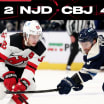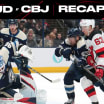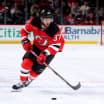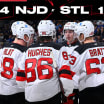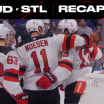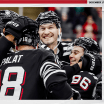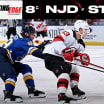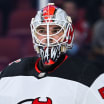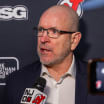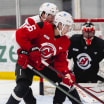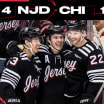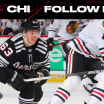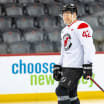"Celebration."
That was the name of the game in Devils Nation, Spring, 1995.
The Cup was won; the franchise won a favorable deal with the Sports Authority and New Jersey still had its only major league sports team.
Nashville would have to wait.
Meanwhile, the celebration took on many forms from media interviews, book-writing, magazine pieces and experts dissecting one of the most extraordinary upsets in NHL history.
NHL Group VP/Communications John Dellapina covered the 1995 Cup title as a Devils beat man for the New York Daily News. He remembered that the club got a bum rap for its so-called stifling style.
"Those Devils were really entertaining," said Dellapina. "They scored a lot of goals. They scored on counterattacks. They were springing traps on people and going 100 mph in the opposite direction.
"And then there was the Holik-Peluso-McKay Crash Line, beating the tar out of you behind your own net. They were an entertaining team to cover from the guys in the locker room to the coaches, Jacques Lemaire and Larry Robinson. The Devils were the league's soundest defensive team with offensive punch to boot."
How to Celebrate a Cup | SUNDAYS WITH STAN
Quotes, stories and reflections following the Devils' 1995 Stanley Cup championship victory
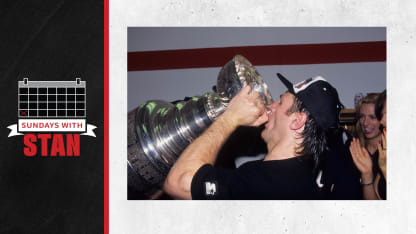
sundays with stan
1995 Stanley Cup Final: Devils vs. Red Wings
Cup Moments and Joyous Aftermath
Reaching the Threshold
To Sweep or Not to Sweep
Getting Closer to Stanley
Can They Beat Detroit Again?
The Decisive Game 1
Previewing the 1995 Final
The Nervous Hours Leading to Game 1
After the dressing room festivities, the individual champions did things in different ways. Broadcaster Mike (Doc) Emrick recalled that he was standing in the hallway outside the dressing room an hour-and-a-half after NHL Commissioner had presented the Cup to team captain Scott Stevens.
"Scott came down the hallway with the Stanley Cup," said Emrick. "Everybody was all dressed up, they were going somewhere for a post-Stanley party.
"The one thing I'll never forget is Scott - with the Cup - walking over to me to let me touch it. I wasn't going to pick it up or do anything like that but he let me just see it, close up and touch it. And then he walked on and that was nice of him."
At the parties, the players did the natural thing; tell stories about how they won while the journalists told their tales in print and electronically.
The man who made it all possible, Lou Lamoriello, answered all questions and then did what he always did best; retreat to his office to plan for next season.
Lou did stop and help Associated Press hockey writer Tim Sullivan who was taking copious notes for his forthcoming book, Battle On The Hudson. Tim wanted to know what was behind Lou's thinking that eventually produced hockey's top prize.
"Anything that was done," Lou explained, "was done to be the best. There was nothing ever personal with the Devils. We were in the frame of mind that we compete against ourselves, more than anything else.
"We don't compete against anyone else. At the end of the game, every day, every minute, you compete against yourself to be the best."
As for "the best," Scott Niedermayer singled out the fans. "They were as passionate as they could be. They knew the game, and they knew how they wanted us to play. I'll always remember that."
Minnesota author Ross Bernstein talked to many of the champion Devils for his book, Raising Stanley - What it takes to Claim Hockey's Ultimate Prize.
He divided his manuscript into compelling chapters with such titles as: The True Meaning Of Winning The Cup; Life Lessons; Winning As A Team; Playing Hurt; Defining Moments; Championship Coaching; Hands On The Prize and Celebrating With Stanley.
Some of the Devils' reactions to Bernstein's questions were fascinating, to say the least.
The True Meaning: Shawn Chambers: "Total dream come true. Leaving it all out there; that's what The Cup is all about."
Life Lessons: Neal Broten: "What hit home the most was something I learned from my peewee coach when I was a little kid. And that was that in order to be successful, you have to play as a team."
Winning As A Team: Bruce Driver: "We had great chemistry. Guys like Neal Broten and Shawn Chambers, who were brought in, fit in really well, and each made big contributions."
Playing Hurt: Shawn Chambers: "It's war. You don't think about it at the time, though, you just play. Every shift there is a little bit extra pain and, over time, it adds up. You basically live with ice bags 24/7."
Defining Moments: Mike Peluso: "Claude Lemieux. We loved him and opposing teams hated him. We beat Boston four games to one and Claude was the one who shut down Cam Neely."
Championship Coaching: Jacques Lemaire: "I coached the way the players wanted me to coach. But I stuck with my ideas and went with what I knew. If my players wanted me to be tougher then I'd get tougher. If they wanted me to ease up on them, then that's what I did - depending on how they responded to what I was asking of them."
Hands On The Prize: Shawn Chambers: "Scott Stevens got it first because he was the captain. From there it went to the two assistants, Ken Daneyko and Bruce Driver. One thing was for sure; we didn't discuss it beforehand. That would have jinxed it for sure. You never talk about winning The Cup. You just win it. Period!"
Celebrating With Stanley: Jim Dowd: "The day started with breakfast with my family, From there I took it to Monmouth race track where I got to spend the day with everybody - from my friends to all my ex-coaches that I had invited. Then we spent a few hours at my sister's bar. We drank a lot of beer and champagne out of that thing. Wow, what a blur."
During - and well after - the celebrations, there was plenty of "What ifs?" and philosophizing.
Randy McKay looked in his rearview mirror and recalled the 1994 seven-game NY Rangers series lost in double-overtime. With that game under mental review, he thought that "It might have been the best thing to happen to us."
Broadcaster Mike Miller seconded the motion, telling Tim Sullivan, "There are many times where you have to lose before you can win."
Ken Daneyko: "You just have to go through that kind of adversity."


